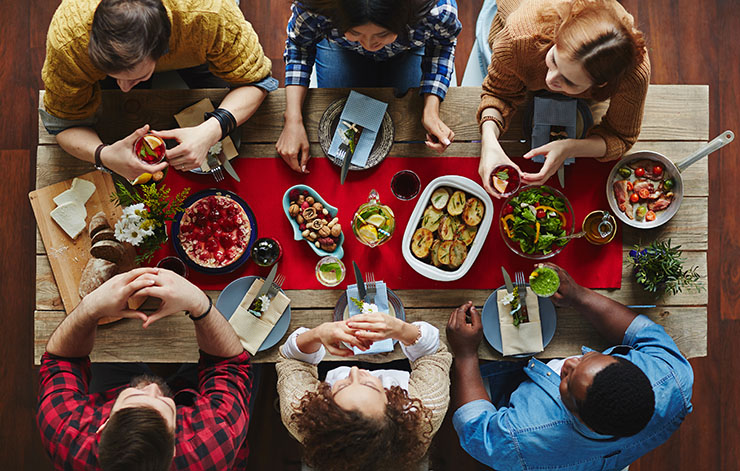Understanding bio-individuality
WORDS Kaisha Scofield
There is no one way to eat. We are biologically unique. Even if we all ate the exact same foods, our bodies would react in very individual ways. The countless differences between our lifestyles, dietary histories, movement habits, stress levels, age and genetics all make for varied nutritional needs. When it comes to nourishing and fuelling the body, we are all perfectly different.
Bio-individuality is the concept that there is no one-size-fits-all diet, and the understanding that our nutritional needs vary depending on a wide variety of factors. It reinforces the idea that eating the same food does not lead to the same digestive outcome from one individual to the next. Understanding bio-individuality can help us to navigate diet confusion and move toward a more personalized and empowered eating style.
Diets are oversimplified eating plans. For example, when I eat corn, it makes my stomach hurt, so I avoid it. Does that then mean that no one else should eat corn? What about dairy or meat? If my neighbour Jenny is living her best life as a vegan, does that mean Uncle Phil is wrong about the keto diet blowing his mind? Of course not—what works for Jenny isn’t necessarily going to work for Phil because their bodies are not the same.
Figuring out your own digestive needs can take time and can be challenging, so here are some tips on how to find what works best for you.
Be your own digestive detective
Keep a digestion journal (note, this is not macro or calorie tracking) and record how you feel when trying something new. Not used to eating gluten? Give it a try and see what happens (unless you have celiac disease). If gluten bugs you, then try sourdough or sprouted oats. If you haven’t had meat in a while, try going to a well-respected butcher and buying meat that has been ethically raised and processed. These experiments may sound scary but as life changes, so too do our digestive and nutritional needs. Where you may have needed lower calories as a university student, those extra hours you’re putting in at the gym these days may mean it’s time to pay more attention to your fuelling.
Be curious
We can get excited when someone tells us about their new diet, especially when they are seeing great results. If their way of eating appeals to you, it is okay to try it out, but it’s important to resist digging in and to know when to accept it, if it isn’t working for you. This doesn’t mean that you are a failure at eating, it simply means that you and your friend have different digestive systems.
Reject rigidity
Excess sugar and highly processed foods should be approached with moderation, but all other foods can be approached with an open mind. If someone tells you that carbohydrates are bad, investigate which carbs work for you and which ones don’t. If you’re lectured about the dangers of meats, try eating meat that appeals to you and see how your body reacts. Think you need to eat nothing but vegetables? How does that feel after a few days? Additions and eliminations should only be considered after you have taken enough time to make an informed choice.
Be supportive
It is important to recognize that everyone’s goals and needs differ, so try to approach food conversations with compassion. We are all just trying to live our healthiest life, so when your coworker comes at you raving about his latest juice cleanse, simply recognize that he is also just trying to find what works for his body.
Be patient
These things can take time and, sometimes, just when you get the hang of things, your life will change and along with it your nutritional needs. Your life, your body and your digestion are not static, and as with any organism, your body will change and evolve according to what it needs at any given time. That is why it is important to be patient and kind to yourself. Commit to taking the time to get to know what works for you so that when life takes a new path, you can keep up.
Eat happy
When was the last time you ate something because it made you happy? We are so focused on restricting because it is expected of us that we often lose the joy of food. There is, of course, a very important distinction to be made between eating foods because they are cheats and eating foods because they bring joy. The former looks like binging on an entire pizza in the closet, while the latter is more akin to going out for fancy doughnuts with friends. It’s important to note that disordered eating is a very real and very common issue that affects people from all backgrounds. If this is something that feels like it might apply to you, know that you are not alone and please seek out help from a mental health and/or eating disorder professional.
Food doesn’t have to be complicated but it does have to be considered. We may have different digestive systems but we generally share the same goals: to eat well, be healthy and enjoy life. Acknowledging your bio-individuality is the first step to achieving these goals by supporting your digestive system. Knowing that we all need different fuel helps us let go of the one-diet-fits-all mentality and approach food with curiosity and enthusiasm, empowering us to do the work and find the very best way to fuel and nourish our perfectly unique bodies.


 Mortal Kombat Star Ludi Lin 真人快打 – 動作明星林路迪
Mortal Kombat Star Ludi Lin 真人快打 – 動作明星林路迪